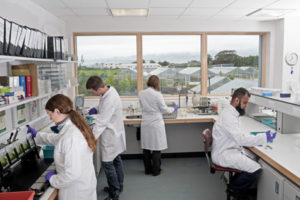GVN Launches Anticipation & Preparedness Task Force
GVN Launches Anticipation & Preparedness Task Force

New and potentially deadly viruses are constantly emerging. But just as likely to cause a viral pandemic may be viruses that are already known – or ones that are re-emerging, taking new forms and spreading beyond their traditional spheres due to climate change, urban expansion, deforestation, international travel, and other factors in our increasingly connected world. Take the most recent ongoing Ebola epidemic in the Democratic republic of Congo, which has become a permanent threat.
These viral outbreaks are inevitable, so it is critical to have the capacity to anticipate and prepare for the next pandemic. To do this, the Global Virus Network (GVN) has launched the Anticipation & Preparedness Task Force (A&P Task Force). “The identification of emerging, re-emerging and unknown infectious diseases and surveillance of viral pathogens humans and wildlife is critical for early prediction of future disease outbreaks and epidemics,” says Christian Bréchot, MD, PhD, president of the GVN. “It must be based on the most modern science and this is what the GVN is about.”
Global group of experts lead task force mission
The group’s mission is to develop and employ innovative approaches to identify and prepare for future viral epidemics. Made up of more than a dozen experts from GVN Centers of Excellence and Affiliates, the task force is led by Dr. Bréchot and co-chaired by Elodie Ghedin, PhD, Director of the Center for Genomics and Systems Biology, and Professor of Biology and Global Public Health at New York University, and Giuseppe Ippolito, MD, the Scientific Director of the National Institute for Infectious Diseases in Rome and Director of the World Health Organization (WHO) Collaborating Center for Clinical Care, Diagnosis, Response and Training on Highly Infectious Diseases at INMI. “I bring the genomic side of things, Giuseppe brings the clinical and epidemiological side,” says Dr. Ghedin.
By combining mathematic modeling with epidemiology, genomics, clinical practice, and public health systems, the task force will build models that can rapidly diagnose and identify viral outbreaks “This work must be based on science and the best of research activities on these topics, ” says Dr. Brechot.
The task force will also develop epidemiological guidelines for the prompt diagnosis, treatment, and prevention of virus-caused disease, as well as support the training of healthcare professionals around the world to address the infectious diseases caused by such viruses. “The GVN has the unique capability of having experts all over the world who have experience in these areas,” Dr. Ippolito says.
Task force will work closely with other organizations
The task force will work closely with public health officials and other global health organizations to collect research and share clinical and scientific information on best practices for the diagnosis and management of viruses. The GVN is now a member of the WHO Global Outbreak Alert and Response Network. “The task force is so important because it connects together experts in different parts of the field,” Dr. Ippolito says, “and I’m confident that it’s going to be an effective way to improve our ability to anticipate and prepare for global outbreaks.”
The task force will also develop standardized practices and protocols for global biodefense and biosecurity to prevent the use of highly infectious viruses as biological agents as bioterrorism. The GVN will work with the WHO to develop, standardize, and implement biosecurity standards and practices. The task force’s biodefense and biosecurity initiative is being led by James LeDuc, PhD, the Director of the Galveston National Laboratory and a professor in the Department of Microbiology and Immunology at the University of Texas Medical Branch in Galveston, Texas.
GVN Virus Watch Groups will play a key role
A key part of the project will be the Virus Watch Groups, which are made up of GVN experts from around the globe. These groups – there are currently eight – will keep the A&P Task Force up-to-date with cutting-edge research and findings from the field and work with local, national, and global institutions if a serious viral threat emerges. The Virus Watch Groups are focused on arboviruses, gastrointestinal viruses, hemorrhagic fevers, herpes, oncogenic viruses, respiratory viruses, retroviruses, and zoonotic viruses.
“We know that outbreaks will happen,” says Dr. Ghedin. “We want to have the tools ready.” The task force will begin with a pilot project – to analyze an emerging virus – that could be done quickly and could illustrate the GVN’s capabilities. “It’s about being proactive,” says Ghedin, “instead of reactive.”
